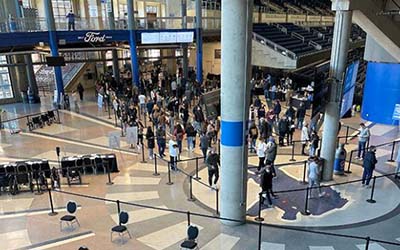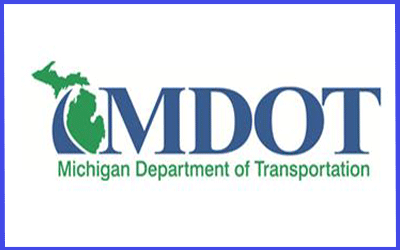
DNR: team aids vaccination effort at Ford Field
 |
|||||
– Showcasing the DNR – |
|||||
|
|||||

 |
|||||
– Showcasing the DNR – |
|||||
|
|||||

FOR IMMEDIATE RELEASE WEDNESDAY, APRIL 14, 2021
CONTACT: Rob Morosi, MDOT Office of Communications, 248-483-5107, MorosiR@Michigan.gov
Reminder: Ongoing bridge work requires closing I-75 this weekend in Oakland County
Fast facts: – Both directions of I-75 will be closed between I-696 and M-102 (8 Mile Road) starting at 11 p.m. Friday and ending by 5 a.m. Monday. – During the closure, all traffic will be detoured to M-1 (Woodward Avenue). – 14 Mile Road closes under I-75 Friday morning for ongoing interchange work.
April 14, 2021 — Weather permitting, overpass replacement will require both directions of I-75 to be closed between M-102 (8 Mile Road) and I-696. The weekend closure is needed to allow crews to safely set bridge beams on the Highland Avenue pedestrian bridge in the city of Hazel Park. The weekend closure will begin at 11 p.m. Friday, April 16, and ends by 5 a.m. Monday, April 19. In addition, both directions of I-75 will be down to one lane between I-696 and 14 Mile Road. Prior to both freeway closures, crews will begin closing ramps at 9 p.m. and start freeway lane closures at 10 p.m. All ramps to northbound I-75 will be closed from Davison Freeway to 9 Mile Road. All ramps to southbound I-75 will be closed from 14 Mile to 9 Mile roads. During the closure, northbound I-75 traffic will be detoured west on 8 Mile Road to northbound M-1 (Woodward Avenue), then eastbound I-696 back to northbound I-75. Southbound I-75 traffic will use westbound I-696 to southbound M-1, then eastbound 8 Mile Road back to southbound I-75. Further north, both directions of 14 Mile Road under I-75, and all interchange ramps, will close for work on the diverging diamond interchange. The closure begins at 7 a.m. Friday, April 16, and ends at 5 p.m. on Monday, April 19. Upon opening 14 Mile Road and all ramps, the left lane on both eastbound and westbound 14 Mile Road will remain closed through mid-summer as crews await equipment arrival needed to complete the required signal installation. Follow I-75 modernization progress on the web at www.Modernize75.com, or follow on Facebook at www.facebook.com/Modernize75 or on Twitter at www.twitter.com/Modernize75. |


FOR IMMEDIATE RELEASE April 14, 2021 Media Contact: Press@Michigan.gov
Michigan expanding the use of monoclonal antibody therapy in the fight against COVID-19
Therapy can help reduce symptoms in patients and risk of hospitalization and death
LANSING, Mich. – Governor Gretchen Whitmer and the Michigan Department of Health and Human Services announced today the state is working to expand the use of a medical intervention designed to significantly reduce hospitalizations and deaths due to COVID-19. This involves additional doses of monoclonal antibodies being made available to providers and requests to providers to expand the number of infusion sites in the state.
“We are using every mitigation strategy, every medication, and every treatment option to fight the virus here in Michigan,” said Governor Gretchen Whitmer
Monoclonal antibodies (mAb) are laboratory-produced molecules that can restore, enhance or mimic the immune system’s attack on cells. mAb targets different parts of the virus and prevents it from bonding with cells in the body, effectively neutralizing it. Clinical trials have shown promising data that this therapy works for the treatment of COVID-19 in patients who are at high risk for progressing to severe symptoms and/or hospitalization, including older Michiganders. To date, preliminary data suggests more than 6,600 Michiganders have received this treatment with 65% reporting feeling better with two days of treatment and less than 5% of them requiring hospitalization following treatment.
“When administered to non-hospitalized patients within 10 days of symptom onset, monoclonal antibodies may reduce symptoms and the risk of hospitalizations and emergency room visits associated with the virus,” said Dr. Joneigh Khaldun, chief medical executive and chief deputy for health. “Michiganders who contract COVID-19 should ask their health care providers about receiving this treatment and I urge providers to assess if their patients qualify. We have seen successful use of this therapy in long-term care facilities and even in home use by EMS providers. This therapy can help save the lives of more Michigan residents as we work to vaccinate 70% of Michiganders age 16 and older with the safe and effective COVID-19 vaccine as quickly as possible.”
“We have been treating patients with monoclonal antibodies over the last five months and we can attest to its success,” said Adnan Munkarah, M.D., Executive Vice President and Chief Clinical Officer, Henry Ford Health System. “This treatment has the potential not only to help patients who are suffering from the severe effects of COVID-19, but also to ease the burden on our hospitals and caregivers. At the same time, we must stay vigilant by getting vaccinated and following the safety measures we have in place.”
The therapy has been used successfully to help address COVID-19 outbreaks in long-term care facilities in the state and to treat patients at home. This has included a 33-patient nursing home in Wayland in January, a senior care facility in Cass County in December and a veteran’s home in Grand Rapids in December. In seven long-term care facility outbreaks, 120 vulnerable patients with high mortality rates were treated with mAb. Only three of those patients needed to be hospitalized with one death.
Michigan was also one of the first states in the nation to issue an EMS protocol to allow paramedics to administer this medication to further increase access. In St. Clair County, Tri-Hospital EMS treated 50 patients at home over a nine-day period. The state is also using EMS to provide paratransit or ambulance transport to infusion clinics for patients who don’t have access to transportation.
The therapy is administered through an intravenous infusion and is designed for people who have tested positive for COVID-19 and have mild to moderate symptoms. It is not intended for hospitalized patients. These treatments are allowed by the U.S. Food and Drug Administration (FDA) under an Emergency Use Authorization. According to the FDA, mAb therapy is effective against the B.1.1.7 (UK) variant, the predominant form of COVID currently seen in Michigan. The National Institutes of Health recently recommended that patients with mild to moderate COVID-19 who are at high risk of worsening disease should be treated with combination therapy — either Lilly or Regeneron.
Michigan continues to monitor and track patients within 14 days of COVID-19 antibody treatment administration to assess the impact of COVID-19 antibody treatments on the state’s COVID-19 hospitalization rate. Additionally, the state is now conducting follow-up phone interviews conducted by volunteer medical and pharmacy students to more effectively assess patient response to mAb.
Additional information on monoclonal antibody therapy can be found at the U.S. Department of Health and Human Services’ Combating COVID website and Michigan.gov/ Michigan residents seeking more information about the COVID-19 vaccine can visit Michigan.gov/ |


FOR IMMEDIATE RELEASE: April 14, 2021
MEDIA CONTACT: Mike Murray, 517-275-1820
$4 million investment in Clean Slate Pilot program launched to assist returning citizens with setting aside a conviction Michigan Department of Labor and Economic Opportunity awards funds to Michigan Works! Agencies to support local expungement efforts
LANSING, Mich. – Over the coming months, returning citizens can get help with expunging eligible convictions from their criminal record to aid them in their pursuit of full-time, self-sufficient employment thanks to a $4M investment in the Clean Slate Pilot program from the Michigan Department of Labor and Economic Opportunity (LEO).
“My goal since day one of taking office has been to build fundamental reforms to make our communities safer and improve the people’s outcomes going through our criminal justice system. The bipartisan Clean Slate legislation fundamentally changed Michigan’s criminal history expungement laws, for the better,” said Lt. Governor Garlin Gilchrist II. “The Clean Slate Pilot program offers a stop-gap for expungement services until the Clean Slate law goes into effect in 2022. We’re excited to get to work. Soon Michiganders will be able to feel the real changes that will come about from this program.”
Setting aside a conviction, sometimes called expungement of criminal records, will remove a specific conviction from a public criminal record. If returning citizens get an order setting aside their conviction, they can legally state on any job or school application that they have never been convicted of or arrested for that crime. They will also be able to state that they have not been convicted of that crime on applications for public benefits, housing or employment.
“Before this legislation and this pilot program, there were many barriers in place for returning citizens,” Susan Corbin, LEO Director said. “These barriers to seeking criminal record expungement include a lack of information, time constraints, cost of retaining a private attorney and fear of the criminal justice system. With the Clean Slate Pilot program, Michigan Works! Agencies will help these citizens overcome many of these barriers and guide them on a path to success.”
The Clean Slate Pilot Program funding will be awarded to all 16 Michigan Works! Agencies (MWAs) throughout the state with each of the agencies providing localized efforts.
“Before this legislation, just under 7% of eligible individuals pursued an expungement,” said Shamar Herron, Executive Director, Michigan Works! Southeast. “We know how important equitable access to expungements are for job seekers. According to a University of Michigan Study, after having a record expunged, job seekers obtained employment at an increase of 11% and their income rose by 25% in two years. Michigan Works! Agencies and the Clean Slate Pilot program will help job seekers overcome many barriers and guide them on a path to success, while providing support to area businesses by increasing the number of available workers, adding to the talent pool.”
To be eligible for assistance through the Clean Slate Pilot Program, the potential participant’s criminal record must have:
All MWAs will have localized Clean Slate Pilot Program processes in place. For more information, visit MichiganWorks.org or call 800-285-9675.
|

|
Media Contact: Kelly Rossman-McKinney FOR IMMEDIATE RELEASE: Attorney General Nessel Partners with Responsibility.org to Prevent Underage Drinking During Alcohol Responsibility MonthAs Conversations between Parents and Kids Increase, Underage Drinking Decreases LANSING – Just in time for Alcohol Responsibility Month, Michigan Attorney General Dana Nessel partnered with Responsibility.org, to share a public service announcement which encourages parents and caregivers to talk to their kids to prevent underage drinking. The PSA comes during the COVID-19 pandemic—a time when discussing the dangers of underage drinking may have taken a backseat in many households. In the PSA, Nessel emphasizes that these conversations are an important step in keeping underage drinking levels down. In fact, 74 percent of 8th graders report they have never consumed alcohol, a statistic that has decreased 63 percent proportionally since 1991. “Not only is underage drinking dangerous and harmful to kids’ developing brains and bodies, but it’s illegal,” Nessel said. “ The importance of encouraging kids to say “yes” to a healthy lifestyle is also emphasized in the PSA. “April is Alcohol Responsibility Month, and as we continue our mission to eliminate underage drinking, we want to remind parents how important conversations with their kids are. Our underage drinking prevention program, Ask, Listen, Learn: Kids and Alcohol Don’t Mix, blends brain science and refusal strategies to help keep kids safe and substance-free,” said Chris Swonger, President and CEO of Responsibility.org. “From 2003 to 2016, conversations between kids and their parents have increased 73 percent, while underage drinking has decreased 50 percent. We have come so far together, but our work is not yet done. We want to continue to keep these statistics moving in the right direction.” The PSA can be viewed online. |